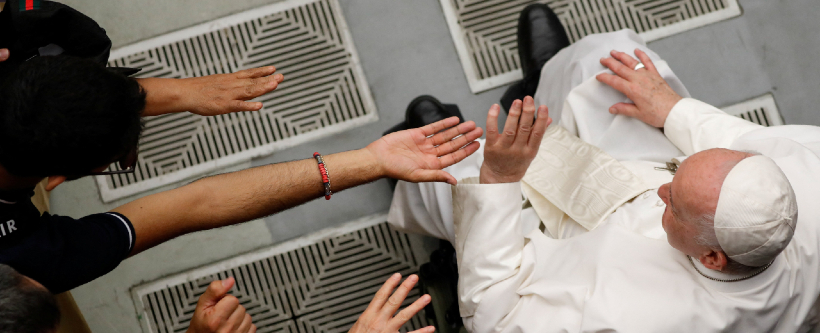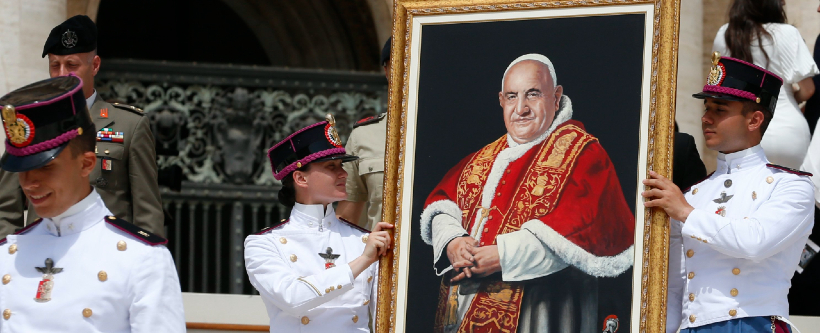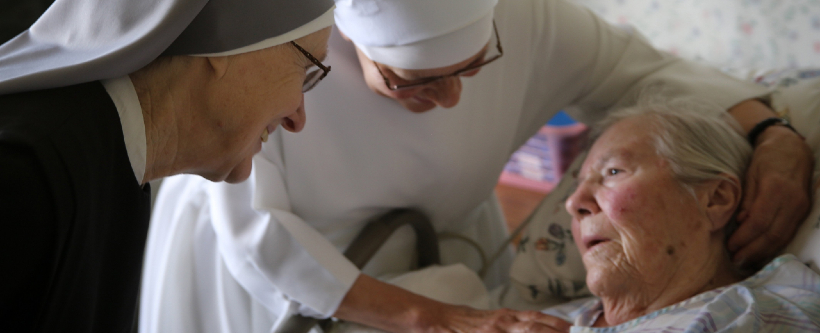
In these Wednesdays, we have reflected on the family. And we go forward on this theme: to reflect on the family.
Starting today, our catecheses will begin with a reflection on the consideration of the vulnerability of the family, in the conditions of life that puts them to the test.
Today we begin with the first. One of these trials is poverty. Let us think of the many families who populate the outskirts of the megacities, but also the rural areas…How much poverty, how much degradation! And then to make matters worse, even war comes to some places. War is always a terrible thing. It especially affects the civilian populations, the families. War is truly “the mother of all poverty”, it impoverishes the family, a great predator of life, of souls, and affects the most sacred and dearest ones.
Despite all this, there are so many poor families who try to live their daily lives with dignity, often openly trusting in the blessing of God. This lesson, however, should not justify our indifference, but rather increase our shame! That there is so much poverty! It is almost a miracle that, even in poverty, the family continues to form and even to conserve – as they can – the special humanity of their bonds. This fact irritates those planners of well-being who consider the affections, the generation, the family bonds, as a secondary variable of the quality of life. They do not understand anything! Instead, we should kneel before these families, who are a true school of humanity that saves societies from barbarism.
What remains, then, if we give in to the blackmail of Caesar and Mammon, of violence and money, and we renounce family affections? A new civil ethic will come only when those responsible for public life reorganize the social bond from the fight against the destructive spiral between family and poverty, which leads us into the abyss.
Today’s economy is often specialized in the enjoyment of individual well-being, but widely practices the exploitation of the family bonds. This is a serious contradiction! The immense work of the family is not quoted in financial statements, naturally! In fact, economy and politics are stingy with acknowledgements in this regard. Yet, the interior formation of the person and social circulation of affections have their pillar precisely there. If you take it away, it all comes down.
It is not just a matter of bread. We speak of work, education, health. It is important to understand this. We always remain very moved when we see pictures of hungry and sick children who are shown to us in many parts of the world. At the same time, we are also very moved by the sparkling gaze of many children, deprived of everything, who are in schools made of nothing, proudly showing their pencils and notebooks. And how they look at their teachers with love! Children truly know that man does not live on bread alone! Even family affections: when there is poverty, children suffer because they want love, the family bond.
We Christians should always be closer to the families tested by poverty. But think about it: all of you know someone; a father without work, a mother without work, and the family suffers! The bonds are weakened. This is bad.
In fact, social poverty strikes the family and, at times, destroys it. The lack or loss of work, or its strong precariousness, has serious implications on family life, severely testing relationships. The living conditions in disadvantaged neighbourhoods, with housing and transportation problems, as well as the reduction of social, health and educational services, causes further difficulty. The damage caused by those pseudo-models can be added to these material factors, disseminated by mass-media based on consumerism and the worship of appearance, that affects the poorest social classes and increases the degradation of family bonds. To care for families, to care for the affections, but misery puts families to the test.
The Church is a mother, and should not forget this tragedy of Her children. She too must be poor, to become fruitful and respond to so much misery. A poor Church is a Church that practices a voluntary simplicity in its own life – in its own institutions, in the lifestyle of its members – to break down every wall of separation, especially by the poor. It takes prayer and action. Let us pray intensely to the Lord, that He shakes us, to make our Christian families protagonists of this revolution of family closeness, which is so necessary now! The Church, since the beginning, is made from that: this family closeness. And we must not forget that the judgment of the needy, of the little ones and of the poor anticipates the judgment of God (Mt. 25, 31-46). Let us not forget this. And let us all do everything that we can to help families to go forward in the trials of poverty and misery that strikes at the affections, the family bonds.
I would like to read once again, the text from the Bible that we heard from the beginning. Each one of us should think about the families that are put to the test, that are tested by misery, by poverty. The Bible says: “My son, deprive not the poor of his living, and do not keep needy eyes waiting.” Let us think about each word! “Do not grieve the one who is hungry, nor anger a man in want. Do not add to the troubles of an angry mind, nor delay your gift to a beggar. Do not reject an afflicted suppliant, nor turn your face away from the poor. Do not avert your eye from the needy, nor give a man occasion to curse you; for if in bitterness of soul he calls down a curse upon you…(Sir. 4: 1-6) For this is what the Lord will do, the Gospel says, if we do not do these things. Thank you!
* * *
Speaker:
Dear Brothers and Sisters:
Today we consider one of the conditions which afflict too many families, namely, poverty.
And yet, in the worst of circumstances, even in war torn areas, how often these families persevere with dignity, entrusting themselves to the goodness of God. It is a miracle that even in extreme situations families continue to be formed and sustained. Sadly, our modern economies often promote individual well-being at the expense of the family.
As Christians, however, we must always look for ways to strengthen and support families, especially poorer ones. The Church, as a mother, can never be blind to the sufferings of her children. For each of us, this means choosing simplicity both individually and in our institutions, so as to break down walls of division and overcome all difficulties, especially poverty.
A poorer Church will bear fruit for so many of her needy children. Let us pray for the grace of conversion so that Christian families everywhere will be truly committed to helping their poorer brothers and sisters.
Pope Francis (In Italian):
I greet the English speaking pilgrims and visitors taking part in today’s Audience, including those from Ireland, Hong Kong, Indonesia, Japan, the Philippines, Taiwan, Canada and the United States. I pray that your visit to Rome may strengthen your faith in the Lord.
In a particular way I wish to express my closeness to the Chinese people in these difficult moments after the ferry disaster in the Yangtze River. I pray for the victims, their families and for all involved in the rescue efforts.
Upon all of you and your loved ones, I invoke the Lord Jesus’ abundant blessings of peace and joy. May God bless you all!
* * *
I address a cordial welcome to the Italian-speaking faithful. I greet in particular the Congregation of the Oratory of Saint Philip Neri, on the fifth centenary of the birth of their found, known as the “Saint of joy”: following his example, may you also be witnesses of the joy of the Gospel. I greet the participants of the Meeting promoted by the Community of Jesus and the workers of the Menu Group of Medolla, an industry rebuilt after the earthquake in 2012.
I am pleased to welcome the faithful of Bolsena, the “Livio Tempesta per la Bontà nella Scuola” and the Don Bosco Institute of Mogliano. I greet the young athletes from the Macerata-Loreto Pilgrimage with the “flame for peace”, accompanied by Bishop Nazzareno Marconi. To all I hope that the visit to the Eternal City will inspire a renewed commitment to peace and solidarity to those most in need.
I address a special thought to the workers of the Whirlpool Factory of Carinaro, and I hope that their serious employment situation may find a quick and fair solution, respecting the rights of everyone, especially the families. The situation in the whole country is particularly difficult. It is important that there is an incisive commitment to open paths of hope.
Finally, I greet the young people, the sick and the newlyweds. The month of June is dedicated to the devotion to the Most Sacred Heart of Jesus. May He teach you, dear young people, the beauty of loving and feeling loved; May He be your support, dear sick, in trials and in sufferings; May He sustain you, dear newlyweds, in your conjugal path. Thank you!






Facebook Comments